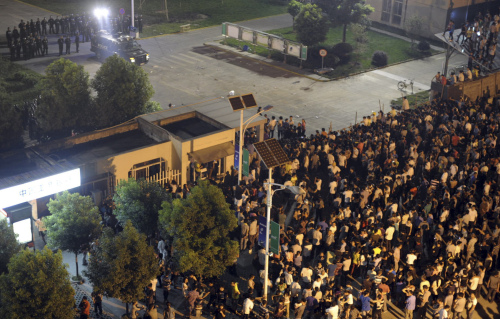SHANGHAI (AP) ― Police detained at least 20 people after hundreds of villagers in eastern China demonstrated against pollution they blame on a solar panel factory, with some protesters storming the compound and overturning vehicles, local authorities said Monday.
The government in Haining city, west of Shanghai, said police imposed traffic controls Sunday to keep order following three nights of gatherings by hundreds of residents ― the latest among increasingly bold public protests driven by environmental concerns.
The factory, Zhejiang Jinko Solar Co. Ltd., was ordered to halt production lines emitting toxic gases or waste pending an investigation, the Haining government said in a statement.
It ordered strict enforcement of environmental protection measures, but also “absolute efforts to ensure stability.”
Zhejiang Jinko Solar Co. is a subsidiary of a New York Stock Exchange-listed company, JinkoSolar Holding Co. Calls to both companies rang unanswered. The company has not issued any public response to the protests.
According to the Haining city government, Zhejiang Jinko Solar’s chairman, Li Xianhua, met with village representatives earlier this month, but the villagers were dissatisfied with the company’s response.
More than 500 people gathered outside the factory on Thursday. Some charged into the factory compound, overturned eight company vehicles and destroyed its offices, the government said. On Friday, demonstrators damaged four police vehicles.
Video footage posted on the website of the city government’s information office showed that the factory’s windows were smashed and dozens of police officers were deployed to the site.
As of Sunday, police had detained 20 people for various alleged offenses, including causing public disorder, vandalism and theft. A 33-year-old man surnamed Sun, meanwhile, was detained for allegedly “spreading false information online” earlier this month about an increase in cancer cases in the nearby village of Hongxiao, the statement said.
 |
Villagers gathered in protest outside the gates to solar panel manufacturer Zhejiang Jinko Solar Co. Ltd. in Hongxiao village in Haining city in eastern China’s Zhejiang province. (AP-Yonhap News) |
The protests reflect the dirty side of clean energy. While use of solar power can reduce the need for burning heavily polluting coal and other fossil fuels, the process of producing photovoltaic cells uses various chemicals and materials that can also be toxic.
Zhejiang Jinko Solar’s waste disposal has been failing pollution tests since April and despite being warned by authorities, the plant has not effectively controlled the pollution, the official Xinhua News Agency cited Chen Hongming, deputy head of Haining’s environmental protection bureau, as saying.
A 64-year-old Hongxiao villager surnamed Shi said not only does the factory discharge waste water into a river, it also spews dense smoke out of a dozen chimneys.
“An elementary school and a kindergarten are located less than a kilometer (0.6 mile) from the plant. My house is only about 500 meters (550 yards) from the plant. Many fish died after the factory discharged waste into a small river,” Shi said in a phone interview.
“The villagers strongly request that this factory be moved to another area. I am very worried about the health of the younger generation,” he said.
After three decades of laxly regulated industrialization, China is seeing a surge in protests over such environmental worries.
Last month, 12,000 residents in the northeastern port city of Dalian protested against a chemical plant after waves from a tropical storm broke a dike guarding the plant and raised fears that flood waters could release toxic chemicals. The massive protests prompted the deployment of riot police and a pledge by local officials to relocate the plant. A similar protest in 2007 in Xiamen was also successful.
Similarly, a spate of cases of lead poisoning from production and recycling of lead-acid batteries for electric bicycles and cars has prompted scores of protests around the country, and a crackdown on hundreds of factories caught violating environmental regulations.
“The public is increasingly adopting a zero tolerance attitude against pollution,” the state-run newspaper Global Times said in a commentary published Monday.
But while protests in middle-class cities like Dalian and Xiamen have succeeded, the government rarely gives in and demonstrations in rural villages don’t often work.




![[Herald Interview] 'Trump will use tariffs as first line of defense for American manufacturing'](http://res.heraldm.com/phpwas/restmb_idxmake.php?idx=644&simg=/content/image/2024/11/26/20241126050017_0.jpg)

![[Health and care] Getting cancer young: Why cancer isn’t just an older person’s battle](http://res.heraldm.com/phpwas/restmb_idxmake.php?idx=644&simg=/content/image/2024/11/26/20241126050043_0.jpg)

